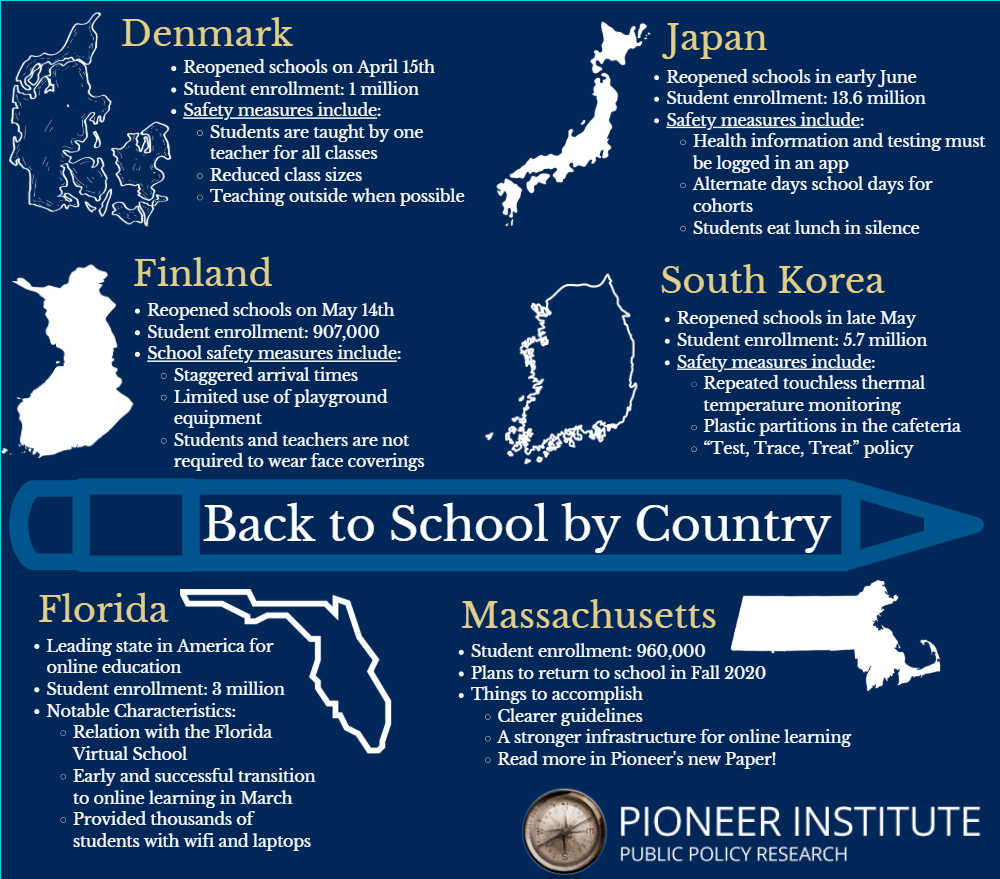New Pioneer Study Looks to International Examples to Inform Massachusetts K-12 Schools Reopening
Best practices from Finland, Denmark, South Korea, and Japan should inform Massachusetts’ reopening plans
BOSTON – With the fall semester fast approaching, Massachusetts should provide more specific COVID-19-related guidance for school districts about ramping up remote learning infrastructure; rotating in-person cohort schedules; diversifying methods of communication between students, parents, and teachers; and investigating physical distancing capabilities. Districts must determine whether to adopt in-person, remote, or hybrid schooling options, and they will not be ready for the fall unless the state provides clear direction, according to new analysis from Pioneer Institute.
“The state’s approach to reopening the schools too closely resembles President Trump’s often too hands-off COVID-19 response,” said Pioneer Executive Director Jim Stergios. “State guidelines can’t just be lists of options. If school districts are to effectively serve Massachusetts’ families, they must also provide direction and express preferences.”
In “How Should Massachusetts Reopen Its K-12 Schools in the Fall? Lessons from Abroad and Other States,” co-authors Max von Schroeter, Nina Weiss, and Thomas O’Rourke analyze measures taken by Finland, Denmark, South Korea, and Japan, which were ahead of the U.S. in their original shutdowns in response to the coronavirus pandemic, and also experienced some reopening and other adaptations in their schools.
The countries were selected due to their success in addressing COVID-19-related schooling issues, as well as offering diverse learning models. Despite some variances in the governance of their education systems, these nations can provide examples and best practices for Massachusetts to consider in its own reopening strategy.
After the initial shutdown, Finland’s students returned to in-person learning before the end of the spring semester. The nation also has a track record of successful online learning infrastructure, which allowed students to remain connected to their lessons during the shutdown. Denmark and South Korea also experimented with allowing certain cohorts of the student population to return to in-person schooling in the spring, and Japan reopened schools for most students as well.
These case studies provide various examples of innovation in physical distancing and hygiene requirements for students and staff, including using more classrooms as “homerooms” to reduce the number of students reporting to an individual teacher, limited or no contact between students at lunch and break times, use of plexiglass barriers and larger separations between desks, as well as temperature monitoring and hand sanitizing rules.

These international examples highlight inadequacies in current Massachusetts Department of Elementary and Secondary Education (DESE) guidelines for returning to school in the fall.
The report also details successful U.S. online learning models, including the Florida Virtual School, and how Massachusetts should include such practices in its own guidance for school districts, whether they return to in-person learning or continue to operate remotely.
“The present challenge is how to implement this much-needed return to school, optimally balancing the importance of in-person schooling with the countervailing importance against the virus,” wrote David Clancy and John Flores in a foreword to the report. “The entire Massachusetts school community must be accountable to ensure that all our students are achieving at their highest level of excellence.”
About the Authors
Thomas O’Rourke is a Roger Perry intern with Pioneer Institute, and a student at Emory University.
Max von Schroeter is a Roger Perry intern with Pioneer Institute, and a student at University of Virginia
Nina Weiss is a Roger Perry intern with Pioneer Institute, and a student at Johns Hopkins University.
David S. Clancy, a resident of Concord, Massachusetts, is a partner in the law firm Clancy & Shine LLC, which focuses on civil disputes. Mr. Clancy was previously partner at an international law firm, from which he retired after a 20-year career, also practicing civil litigation. Among other professional activities, Mr. Clancy served three terms on the Board of Editors of the Boston Bar Journal, and has published multiple articles in that and other legal publications.
Dr. John G. Flores is CEO and executive director emeritus of the United States Distance Learning Association, and an authority in the field of education, technology, and telecommunications. Flores led a Global Association focused on the application of distance learning for varied constituencies using varied technologies. He has held leadership positions as a School Superintendent, University Executive Dean and Business CEO for Distance Learning companies. He received his M.A. from Boston University and his Ph.D. from the University of Connecticut focusing on educational technology, instructional design and leadership.
About Pioneer
Mission: Pioneer Institute develops and communicates dynamic ideas that advance prosperity and a vibrant civic life in Massachusetts and beyond.
Vision: Success for Pioneer is when the citizens of our state and nation prosper and our society thrives because we enjoy world-class options in education, healthcare, transportation and economic opportunity, and when our government is limited, accountable and transparent.
Values: Pioneer believes that America is at its best when our citizenry is well-educated, committed to liberty, personal responsibility, and free enterprise, and both willing and able to test their beliefs based on facts and the free exchange of ideas.
Get Updates on Our Education Research
Related Content













